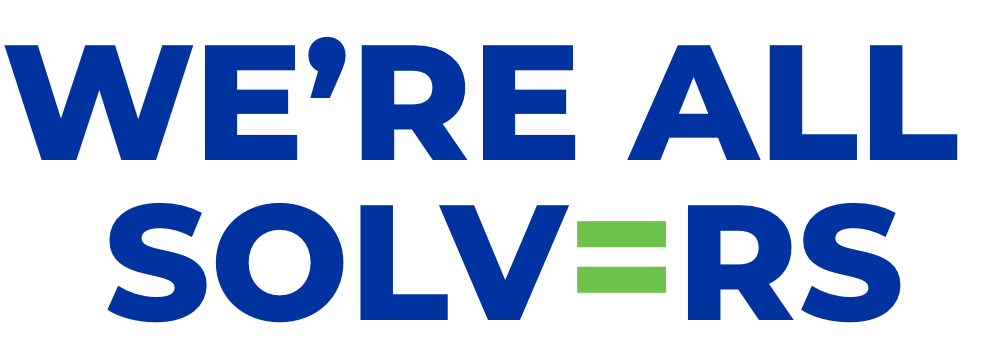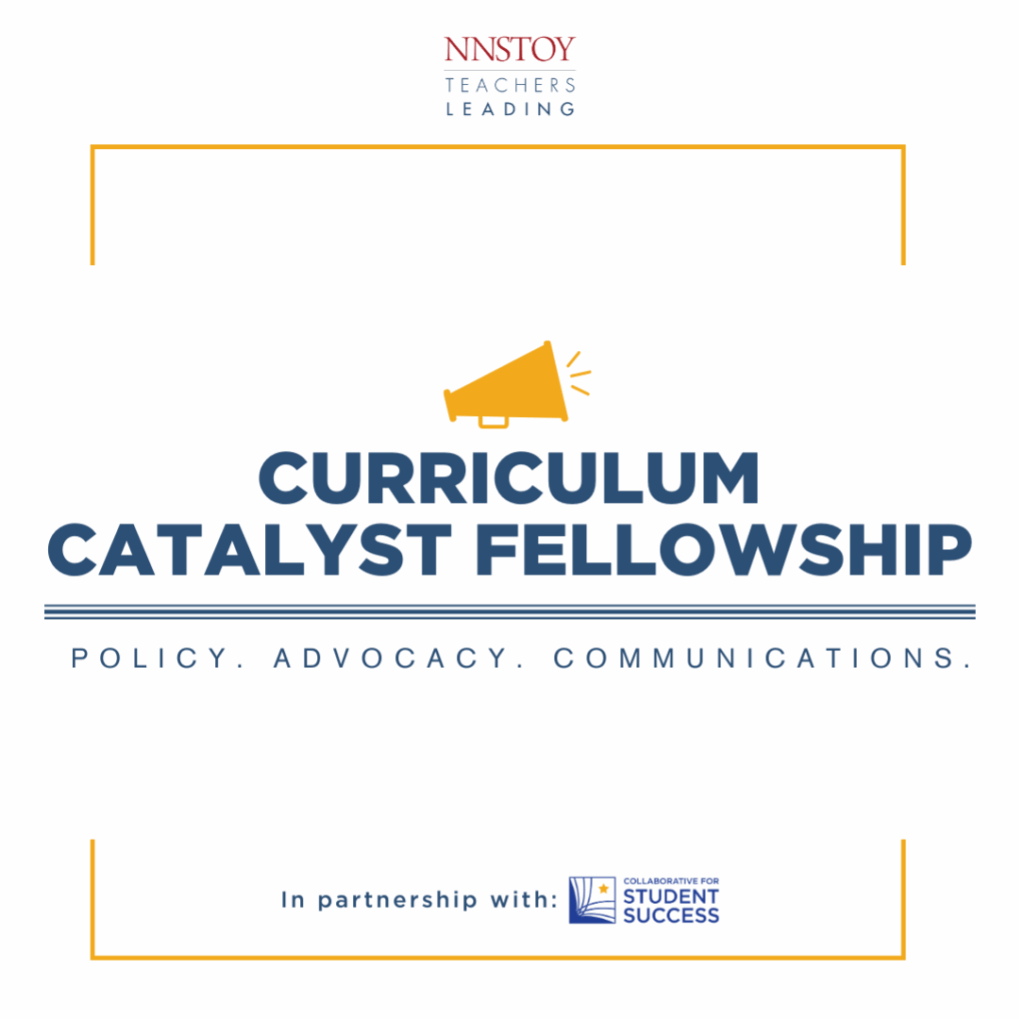If you’re a person, you’re a math person.
We’re born with brains that were built to solve problems. So let’s approach math education with the unshakeable belief that math is for everyone.
Why this matters
The common misconception that math is only relevant for careers in science or engineering – combined with
the stereotype that it is okay to be bad at math – is the one-two punch that wreaks havoc on America’s approach to math education.
The latest NAEP results should alarm us all and spur urgent action – particularly as recent research shows math scores closely tied to salary at age 30 for children of all backgrounds. Read the statement signed by 28 organizations on why it is time to move past the data and take collective action.
On the 2024 Nation’s Report Card, math progress remains stagnant with scores still below pandemic levels.

What’s Needed
We call on states and districts to take decisive action by adopting policies that will raise student math achievement.
We recommend six key strategies, backed by research and practice.
6 Strategies
Expand access to high-quality instructional materials.
Provide educators with high-quality professional learning aligned with classroom materials.
Increase instructional time before, during, and after the school day.
Automatically enroll students into advanced math courses when they’re ready.
Hold teacher preparation programs accountable for equipping teachers with the math skills, content, and mindsets needed to succeed.
Leverage math coaches to help teachers to improve classroom practice.
Automatic Enrollment
Students who are ready for advanced math courses should not be overlooked in school because of assumptions that they’re not a ‘math person.’
A growing group of bipartisan states are adopting auto-enrollment policies to ensure all students who are ready for expanded opportunities in math are able to claim a seat in an advanced math course.
Commitment
We see encouraging signs that state leaders across the nation believe that every child can be good at math – with efforts underway to open access to advanced classes, increase the use of high-quality classroom materials, and strengthen supports for educators.
ALABAMA
Alabama’s Numeracy Act (SB171), passed in 2022, created the Office of Mathematics Improvement to monitor the implementation of mathematics screener assessments, diagnostic assessments, and formative assessments for grades K-5. It also requires all K-2 students to be assessed using an early numeracy screener and grades 4-5 students must be assessed by a fractional reading screener at least two times a year. The legislation also allocates one mathematics coach for every public K-5 school with a student population of less than 800, and two coaches for a school with a student population of 800 or more.
ARKANSAS
In 2023, the Arkansas legislature passed a sweeping education reform bill known as the LEARNS Act, which includes a provision requiring each public school district and open enrollment charter school to develop a math intervention plan in the ‘23-’24 school year for students in grades 3-8 who do not perform at or above grade level on the state assessment. The legislation further requires districts to report in the ‘24-’25 school year the types of interventions being used and the number of students using them.
COLORADO
Colorado’s SB23, passed this year, requires the Department of Education, by January 2024, to offer free optional training in evidence-informed practices in mathematics, including training specifically designed for elementary school educators and secondary school mathematics educators. The bill also creates a grant program for interventions to help students who are below grade level or struggling in mathematics, children with disabilities, and students who are English learners.
FLORIDA
In May 2023, the Florida legislature passed a larger bill focused on literacy which includes a requirement for students in grades K-4 who show a “substantial deficiency in mathematics or dyscalculia” to receive support via intervention programs set out by the Department of Education and for parents to be notified of this support. It also requires districts to monitor these students’ performance and keep the parents updated and informed of performance progress.
LOUISIANA
In June 2023, the Louisiana legislature passed a bill that requires math teachers who teach grades 4-8 to take additional professional development related to numeracy; and requires districts to produce annual reports on the number of teachers who have successfully done so.
NORTH CAROLINA
Since the passage of HB 986 in 2018, North Carolina has had automatic enrollment in advanced math courses for all qualified students, elementary through high school. Legislation requires that all students who score a level five (the highest level) on their end-of-grade tests in math be automatically placed in an advanced math class the following year.
Since implementation and after a 2019 update requiring more annual reporting by region and subgroups, enrollment for advanced math courses has increased in all grade levels where the courses are offered, and evidence has shown meaningful increases in low-income and minority students taking advanced math courses. In the critical years of 8th through 11th grade, more than 95% of eligible students are now being enrolled in advanced math courses. Additionally, more middle schools are now offering high school level math courses. Not only are the percentage of eligible students increasing, but the pool of eligible students is increasing. In the last two years, the number of eligible students increased from 29k to 58k.
TEXAS
Texas passed legislation in 2023 (SB 2124) aimed at increasing the number of students in advanced mathematics courses in middle school and high school. The bill requires each school district and charter school to develop an advanced math program for middle school students such that the top 40% performers on the 5th grade math assessment exam be automatically enrolled in advanced math courses for 6th grade. This puts these advanced students on track to take Algebra 1 in their 8th-grade year, opening the door for them to take advanced classes such as calculus in high school. The parent may opt out of this automatic enrollment for their child.
VIRGINIA
In April 2022, Virginia passed legislation (HB938) requiring the state Board of Education to convene a group of stakeholders to provide feedback to the General Assembly on a number of key education goals, specifically including promoting excellence in math instruction. The report, released in the summer of 2023, called for enacting mathematics instruction reform that will prioritize the “science of math” approach to teaching mathematics in grades K-8, supporting the expansion of teacher professional learning opportunities to ensure high quality mathematics instruction is provided to all students. It also included recommendations to revise the state’s math standards, which now require the board to define “mastery” or proficiency for every grade level, that students have personalized mathematics pathways based on mastery and readiness, and that teachers determine the instructional sequence of the content that is best suited to meet the needs and goals of the student.
WEST VIRGINIA
In March 2023, the West Virginia legislature passed HB 3035, known as the Third Grade Success Act, aimed at developing a multi-tiered system of support for early literacy and numeracy in kindergarten through grade 3. Among the math provisions, the bill requires the development of an “appropriate list of literacy and numeracy screening tools, the creation of individualized reading or mathematics improvement plans for students identified as having a deficiency in grades K-4, and participation in comprehensive training on the science of reading and numeracy instruction.
Curriculum and Instruction
Stay up-to-date on leading state efforts to advance high-quality instructional materials, use statewide annual assessments to track student achievement, and to accelerate learning – all on CurriculumHQ, AssessmentHQ, and EduProgress.
Explore the leading state efforts to advance high-quality instructional materials, as well as expert commentary on educator resources, trends, and research from Jocelyn Pickford.
Explore the leading state efforts to accelerate learning beyond the pandemic, with expert commentary from Chad Aldeman.
Champions
Real change takes a Champion – and we’re committed to identifying and supporting expert math Champions pushing for greater opportunities for K-12 students.
The Curriculum Catalyst Fellowship is a one-year program currently engaging eight state teachers of the year or finalists who are dedicated to advancing policies and practices that support expanded availability and use of high-quality instructional materials in math and science.
Vanessa Vakharia is known as the “Math Guru” and is dedicated to helping students and families tackle math anxiety. With an international following, Vakharia is passionate about bringing math to life for students by making it engaging, connecting math to their real world experiences, and spreading the belief that we are all math people.
The Solvers' Social
Games aren’t just fun—they’re foundational.
The Solvers’ Social shows how board and card games can build confidence, spark math thinking, and help families create a Healthy Math Home where problem-solving is part of everyday life.
2025 National Teacher Leadership Conference
CSS brought the We’re All Solvers campaign to Orlando, Fla., hosting another Solvers’ Social at the 2025 National Teacher Leadership Conference hosted by the National Network of State Teachers of the Year. After a full day of sessions, attending national and state teachers of the year and finalists came together for an evening of math games, karaoke, and connection.
More than just fun, the Solvers’ Social reinforced the important belief that everyone is a math person. By blending learning with fun, the event helped shift mindsets and spark new ideas for making math more engaging in classrooms across the country.
Rhode Island Department of Education Math Extravaganza
CSS brought the Solvers’ Social to Rhode Island in support of the state’s Math Matters campaign and the result was an inspiring, high-energy morning that put the joy of math front and center.
Held in partnership with state education leaders, the event welcomed families, educators, and community members for hands-on activities designed to build Healthy Math Homes—environments where kids grow up seeing themselves as confident, capable problem solvers.
Rhode Island Governor Dan McKee, Rhode Island Education Commissioner Angelica Infante-Green, and Mayors Brett Smiley (Providence), Chris Beauchamp (Woonsocket), and Bob DaSilva (East Providence) joined the event, proudly wearing their “I’m a math person” shirts! Their presence underscored the state’s strong commitment to ensuring every child has the opportunity to build math confidence and success.
2025 SXSW EDU
In March, CSS hosted the first Solvers’ Social at SXSW EDU 2025! It was an unforgettable evening filled with games, fun, and math! With a fantastic turnout of educators, school leaders, and both math enthusiasts and skeptics alike, the event was a resounding success in bringing people together to challenge the myth that math isn’t for everyone.
With expert teachers from the National Network of State Teachers of the Year leading the way, participants discovered how everyday games can strengthen problem-solving skills, spark curiosity, and make math a natural and joyful part of life.
Updates

What Can States Do to Help Students Learn More Math?
Math scores have been in decline for the last decade, and a recent estimate found that boosting scores back to their 2013 levels would raise the average student’s total lifetime earnings by nearly 8%.

States are obscuring student math performance
The Center on Reinventing Public Education’s new State of the American Student 2025 report delivers a sobering verdict: most states are failing to give parents and the public a clear view of how students are doing in math.

Yes, Alabama! The kids can learn math.
By all recent accounts, the kids are not all right when it comes to learning math in this country.
Resources for Leaders & Educators
Stay up-to-date on the leading state efforts to advance high-quality instructional materials, use statewide annual assessments to track student achievement, and to accelerate learning past the pandemic – all on CurriculumHQ, AssessmentHQ, and EduProgress.
Videos
Busting Society’s Math Myths with Vanessa Vakharia
Vanessa Vakharia takes to the streets to bust society’s biggest math myths.
You ARE a Math Person with Vanessa Vakharia
Vanessa Vakharia is on a mission to prove that everyone is indeed a math person.








